Description and operation. Diagnosis and testing
Steering system Description Power steering systems consist of: Operation The steering column shaft is attached to the gear
pinion. The rotation of the pinion moves the gear
rack from side-to-side. This lateral action of the rack
pushes and pulls the tie rods to change the direction
of the front wheels.
Power assist is provided by an engine mounted
hydraulic pump, (Fig. 1) and (Fig. 2) the pump supplies
hydraulic fluid pressure to the steering gear.
Some vehicles are equipped with an oil cooler.
1 - HYDRAULIC PUMP 2 - RACK AND PINION GEAR 3 - OIL COOLER
1 - HYDRAULIC PUMP 2 - RACK AND PINION GEAR 3 - OIL COOLER STEERING NOISE There is some noise in all power steering systems. One of the most common is
a hissing sound evident at a
standstill parking. Or when the steering wheel is at the end of it's travel.
Hiss is a high frequency noise similar
to that of a water tap being closed slowly. The noise is present in all valves
that have a high velocity fluid passing
through an orifice. There is no relationship between this noise and steering
performance. 2. Noisy valve in power steering gear. 2. Replace steering gear. 2. Loose or damaged
suspension
components. 3. Internal gear noise. 4. Pressure hose in contact with other
components 5. Loose or damaged intermediate shaft or
column 2.
Inspect and repair suspension. 3. Replace steering gear. 4. Reposition hose. 5. Inspect and repair or replace. 2. Pressure hose in contact with other
components. 3. Internal pump noise. 2. Reposition hose. 3. Replace pump. 2. O-ring missing or damaged on hose
fitting. 3. Low fluid level. 4. Air leak between pump and reservoir. 5. Reservoir cap not installed correctly. 2. Replace o-ring. 3. Fill to proper level. 4. Repair as necessary. 5. Install reservoir cap correctly. 2. Wrong gear. 2. Verify gear. BINDING AND STICKING 2. Tire pressure. 3. Steering components (ball
joints/tie rod ends). 4. Loose belt. 5. Low pump pressure. 6. Column shaft coupler binding. 7. Steering gear worn. 2. Adjust tire pressure. 3 Inspect and repair as necessary. 4. Adjust or replace. 5. Pressure test and replace if
necessary. 6. Replace coupler. 7. Replace gear. INSUFFICIENT ASST. OR POOR RETURN TO CENTER 2. Low fluid level. 3. Loose belt. 4. Low pump pressure. 5. Internal gear leak. 2. Fill to proper level. 3. Adjust or replace. 4. Pressure test and repair as
necessary. 5. Replace gear. 2. Wheel alignment. 3. Lack of lubrication. 4. High friction in steering gear. 2. Align front end. 3. Inspect and lubricate suspension
compnents. 4. Replace gear. LOOSE STEERING AND VEHICLE LEAD 2. Worn or loose wheel bearings. 3. Steering gear mounting. 4. Gear out of adjustment. 5. Worn or loose steering coupler. 2. Inspect and repair or
adjust
bearings. 3. Tighten gear mounting bolts to
specification. 4. Replace gear. 5. Inspect and replace as
necessary. 2. Radial tire lead. 3. Brakes dragging. 4. Wheel alignment. 2. Rotate tires. 3. Repair as necessary. 4. Align front end. The following procedure is used to test the operation
of the power steering system on the vehicle. This
test will provide the gallons per minute (GPM) or
flow rate of the power steering pump along with the
maximum relief pressure. Perform test any time a
power steering system problem is present. This test
will determine if the power steering pump or power
steering gear is not functioning properly. The following
pressure and flow test is performed using Power
Steering Analyzer Tool kit 6815 (Fig. 3) and (Fig. 4)
Adapter Kit 6893. FLOW AND PRESSURE TEST (1) Check the power steering belt to ensure it is in
good condition and adjusted properly.
(2) Connect pressure gauge hose from the Power
Steering Analyzer to Tube 6844.
(3) Connect Adapter 6826 to Power Steering Analyzer
test valve end.
(4) Disconnect the high pressure hose from the
power steering pump.
(5) Connect the tube to the pump hose fitting.
(6) Connect the power steering hose from the
steering gear to the adapter.
(7) Open the test valve completely.
(8) Start engine and let idle long enough to circulate
power steering fluid through flow/pressure test
gauge and to get air out of the fluid. Then shut off
engine.
(9) Check fluid level, add fluid as necessary. Start
engine again and let idle.
1 - GAUGE HOSE 2 - TUBE 3 - ADAPTER FITTINGS 4 - ANALYZER (10) Gauge should read below 862 kPa (125 psi), if
above, inspect the hoses for restrictions and repair as
necessary. The initial pressure reading should be in
the range of 345-552 kPa (50-80 psi).
(11) Increase the engine speed to 1500 RPM and
read the flow meter. If the flow rate (GPM) is below
specification, (refer to pump specification chart for
GPM) the pump should be replaced.
1 - TUBE 2 - ADAPTER FITTINGS 3 - ANALYZER 4 - GAUGE HOSE CAUTION: The following test procedure involves
testing maximum pump pressure output and flow
control valve operation. Do not leave valve closed
for more than three seconds as the pump could be
damaged. (12) Close valve fully three times and record highest
pressure indicated each time. All three readings
must be above specifications and within
345 kPa (50 psi) of each other. (13) Open the test valve and turn the steering
wheel to the extreme left and right positions three
times against the stops. Record the highest pressure
reading at each position. Compare readings to the
pump specifications chart. If pressures readings are
not within 50 psi of each other, the gear is leaking
internally and must be replaced. CAUTION: Do not force the pump to operate
against the stops for more than 2 to 3 seconds at a
time because, pump damage will result. PUMP SPECIFICATION Description and operation
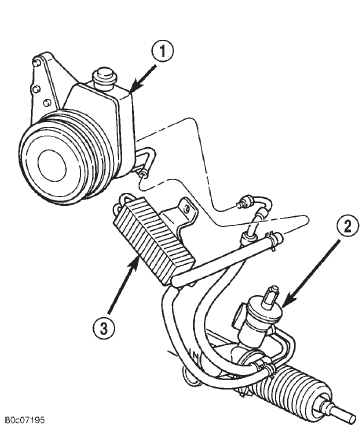 Fig. 1 Steering Pump, Gear And Oil Cooler - 5.2L & 5.9L
Fig. 1 Steering Pump, Gear And Oil Cooler - 5.2L & 5.9L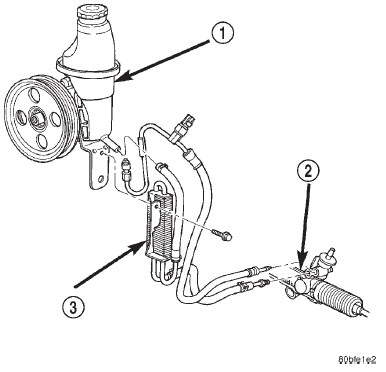 Fig. 2 Steering Pump, Gear And Oil Cooler - 4.7L
Fig. 2 Steering Pump, Gear And Oil Cooler - 4.7LDiagnosis and testing
Power steering system
CONDITION
POSSIBLE CAUSES
CORRECTION
OBJECTIONAL HISS OR
WHISTLE
1. Steering intermediate shaft to dash panel
seal.
1. Check and repair seal at dash
panel.
RATTLE OR CLUNK
1. Gear mounting bolts loose.
1. Tighten bolts to specification.
CHIRP OR SQUEAL
1. Loose belt.
1. Adjust or replace.
WHINE OR GROWL
1. Low fluid level.
1. Fill to proper level.
SUCKING AIR SOUND
1. Loose return line clamp.
1. Replace clamp.
SCRUBBING OR
KNOCKING
1. Wrong tire size.
1. Verify tire size.
CONDITION
POSSIBLE CAUSE
CORRECTION
DIFFICULT TO TURN WHEEL
STICKS OR BINDS
1. Low fluid level.
1. Fill to proper level.
CONDITION
POSSIBLE CAUSE
CORRECTION
HARD TURNING OR MOMENTARY
INCREASE IN TURNING EFFORT
1. Tire pressure.
1. Adjust tire pressure.
STEERING WHEEL DOES NOT
WANT TO RETURN TO CENTER
POSITION
1. Tire pressure.
1. Adjust tire pressure.
CONDITION
POSSIBLE CAUSE
CORRECTION
EXCESSIVE PLAY IN STEERING
WHEEL
1. Worn or loose suspension or
steering components.
1. Inspect and repair as necessary.
VEHICLE PULLS OR LEADS TO
ONE SIDE.
1. Tire Pressure.
1. Adjust tire pressure.
Power steering flow and pressure
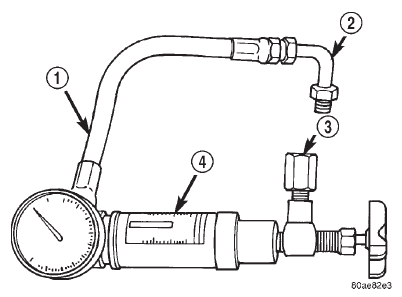 Fig. 3 Analyzer With Tube and Adapter For 5.2L & 5.9L
Fig. 3 Analyzer With Tube and Adapter For 5.2L & 5.9L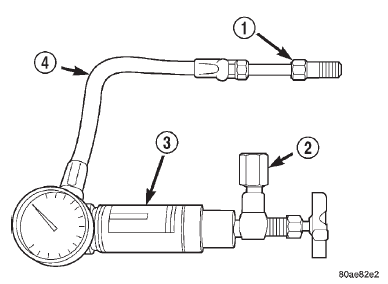 Fig. 4 Analyzer With Tube and Adapter For 4.7L
Fig. 4 Analyzer With Tube and Adapter For 4.7L
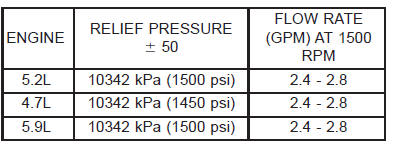
Dodge Durango (DN) 1998-2003 Service Manual
- Lubrication and Maintenance
- Suspension
- Differential and Driveline
- Brakes
- Cooling System
- Battery
- Starting Systems
- Charging System
- Ignition System
- Instrument Panel Systems
- Audio Systems
- Horn Systems
- Speed Control System
- Turn Signal and Hazard Warning Systems
- Wiper and Washer Systems
- Lamps
- Passive Restraint Systems
- Electrically Heated Systems
- Power Distribution System
- Power Lock Systems
- Vehicle Theft/Security Systems
- Power Seat System
- Power Window Systems
- Power Mirror Systems
- Chime/Buzzer Warning Systems
- Overhead Console Systems
- Engine
- Exhaust System
- Frame and Bumpers
- Fuel System
- Steering
- Transmission and Transfer Case
- Tires and Wheels
- Body
- Heating and Air Conditioning
- Emission Control Systems
- Introduction
